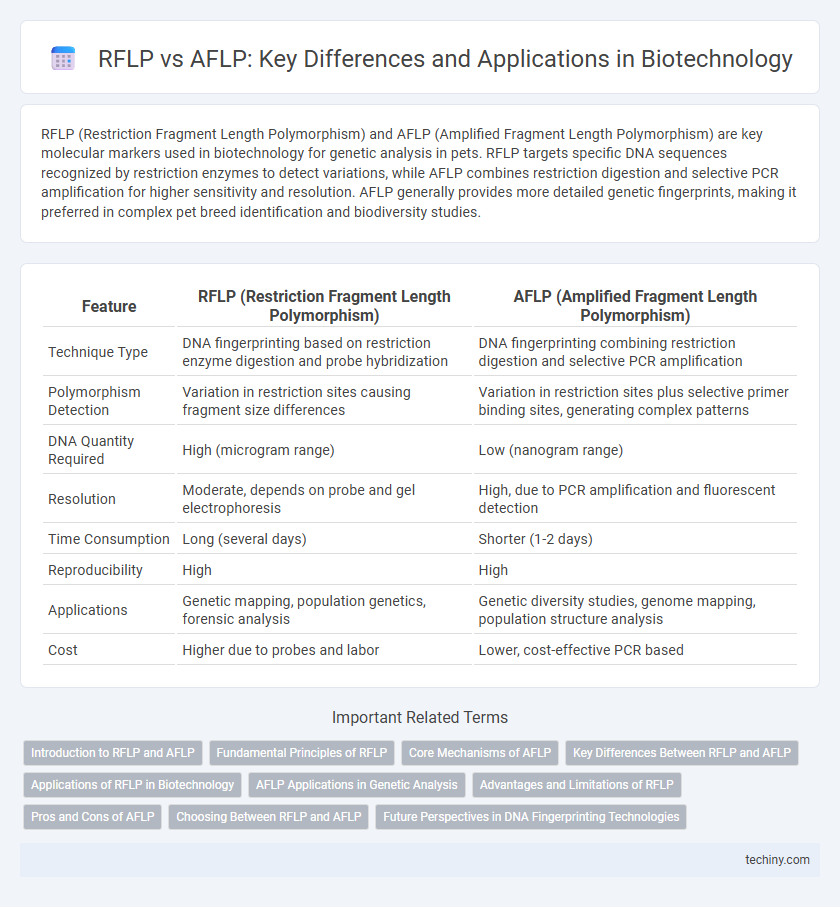RFLP (Restriction Fragment Length Polymorphism) and AFLP (Amplified Fragment Length Polymorphism) are key molecular markers used in biotechnology for genetic analysis in pets. RFLP targets specific DNA sequences recognized by restriction enzymes to detect variations, while AFLP combines restriction digestion and selective PCR amplification for higher sensitivity and resolution. AFLP generally provides more detailed genetic fingerprints, making it preferred in complex pet breed identification and biodiversity studies.
Table of Comparison
| Feature | RFLP (Restriction Fragment Length Polymorphism) | AFLP (Amplified Fragment Length Polymorphism) |
|---|---|---|
| Technique Type | DNA fingerprinting based on restriction enzyme digestion and probe hybridization | DNA fingerprinting combining restriction digestion and selective PCR amplification |
| Polymorphism Detection | Variation in restriction sites causing fragment size differences | Variation in restriction sites plus selective primer binding sites, generating complex patterns |
| DNA Quantity Required | High (microgram range) | Low (nanogram range) |
| Resolution | Moderate, depends on probe and gel electrophoresis | High, due to PCR amplification and fluorescent detection |
| Time Consumption | Long (several days) | Shorter (1-2 days) |
| Reproducibility | High | High |
| Applications | Genetic mapping, population genetics, forensic analysis | Genetic diversity studies, genome mapping, population structure analysis |
| Cost | Higher due to probes and labor | Lower, cost-effective PCR based |
Introduction to RFLP and AFLP
RFLP (Restriction Fragment Length Polymorphism) is a molecular technique that detects variations in DNA sequences by cutting DNA with specific restriction enzymes and separating the fragments by gel electrophoresis. AFLP (Amplified Fragment Length Polymorphism) enhances genetic fingerprinting by combining restriction digestion and selective PCR amplification, providing higher sensitivity and resolution. Both methods are widely used in genetic mapping, biodiversity studies, and marker-assisted selection in biotechnology.
Fundamental Principles of RFLP
Restriction Fragment Length Polymorphism (RFLP) is based on the identification of variations in DNA sequences by detecting fragments generated through restriction enzyme digestion. These enzymes cut DNA at specific recognition sites, producing distinct fragment patterns that reflect genetic differences. The fundamental principle leverages the presence or absence of restriction sites to analyze genetic diversity, gene mapping, and molecular diagnostics.
Core Mechanisms of AFLP
Amplified Fragment Length Polymorphism (AFLP) employs selective PCR amplification of restriction fragments generated by two restriction enzymes, enhancing polymorphism detection with high reproducibility and resolution. Unlike Restriction Fragment Length Polymorphism (RFLP), which relies solely on restriction digestion and probe hybridization, AFLP integrates adapter ligation and selective primer extension to amplify specific DNA subsets. This core mechanism enables AFLP to detect multiple loci simultaneously, providing superior sensitivity for genetic mapping and diversity studies in biotechnology.
Key Differences Between RFLP and AFLP
RFLP (Restriction Fragment Length Polymorphism) analyzes variations in DNA sequences by detecting fragment length changes after restriction enzyme digestion, whereas AFLP (Amplified Fragment Length Polymorphism) combines restriction digestion and selective PCR amplification to identify polymorphisms. RFLP requires larger amounts of high-quality DNA and is less sensitive compared to AFLP, which can detect multiple polymorphisms simultaneously with higher sensitivity and resolution. AFLP is more efficient for genome-wide scanning, while RFLP is traditionally used for specific locus analysis and genetic mapping.
Applications of RFLP in Biotechnology
Restriction Fragment Length Polymorphism (RFLP) is widely applied in biotechnology for genetic mapping, DNA fingerprinting, and detecting mutations associated with hereditary diseases. It enables identification of polymorphic variations in DNA sequences, facilitating marker-assisted selection in plant and animal breeding. RFLP also plays a crucial role in forensic analysis and paternity testing by comparing DNA fragment patterns.
AFLP Applications in Genetic Analysis
Amplified Fragment Length Polymorphism (AFLP) is extensively used in genetic analysis for its high reproducibility and ability to detect numerous polymorphisms without prior sequence information. It enables detailed genetic mapping, diversity studies, and genotype identification across various organisms, making it invaluable in plant and animal breeding programs. AFLP's sensitivity to detect subtle DNA variations enhances its application in evolutionary biology and population genetics.
Advantages and Limitations of RFLP
RFLP (Restriction Fragment Length Polymorphism) offers high specificity and reliability in detecting genetic variation by analyzing DNA fragment patterns generated by restriction enzymes, making it valuable for genetic mapping and diversity studies. However, its limitations include requiring large amounts of high-quality DNA, being labor-intensive, and having lower sensitivity compared to AFLP (Amplified Fragment Length Polymorphism). Unlike AFLP, RFLP struggles with detecting small or rare polymorphisms and is less suitable for high-throughput applications due to longer processing times and complex protocols.
Pros and Cons of AFLP
AFLP (Amplified Fragment Length Polymorphism) offers high reproducibility and sensitivity, making it suitable for detecting genetic variation across entire genomes without prior sequence information. The technique combines restriction digestion with selective PCR amplification, allowing for the analysis of multiple loci simultaneously, which enhances throughput compared to RFLP (Restriction Fragment Length Polymorphism). However, AFLP requires high-quality DNA samples and involves complex protocols that can be technically demanding and costly, limiting its accessibility for some laboratories.
Choosing Between RFLP and AFLP
Choosing between RFLP and AFLP depends on the specificity, sensitivity, and throughput requirements of the biotechnology application. RFLP offers high reproducibility and is effective for detecting known genetic variations but requires larger DNA quantities and is more time-consuming. AFLP provides greater resolution and sensitivity for genome-wide analysis, making it suitable for genetic mapping and diversity studies in species with limited genomic information.
Future Perspectives in DNA Fingerprinting Technologies
RFLP (Restriction Fragment Length Polymorphism) and AFLP (Amplified Fragment Length Polymorphism) remain pivotal in DNA fingerprinting, yet emerging technologies like next-generation sequencing are poised to surpass their resolution and throughput. Future perspectives emphasize integrating AFLP's versatility and RFLP's specificity with CRISPR-based genomic editing tools to enhance precision in genetic mapping and biodiversity studies. Innovations in bioinformatics algorithms will further optimize data analysis from these methodologies, driving advancements in personalized medicine and agricultural biotechnology.
RFLP vs AFLP Infographic

 techiny.com
techiny.com